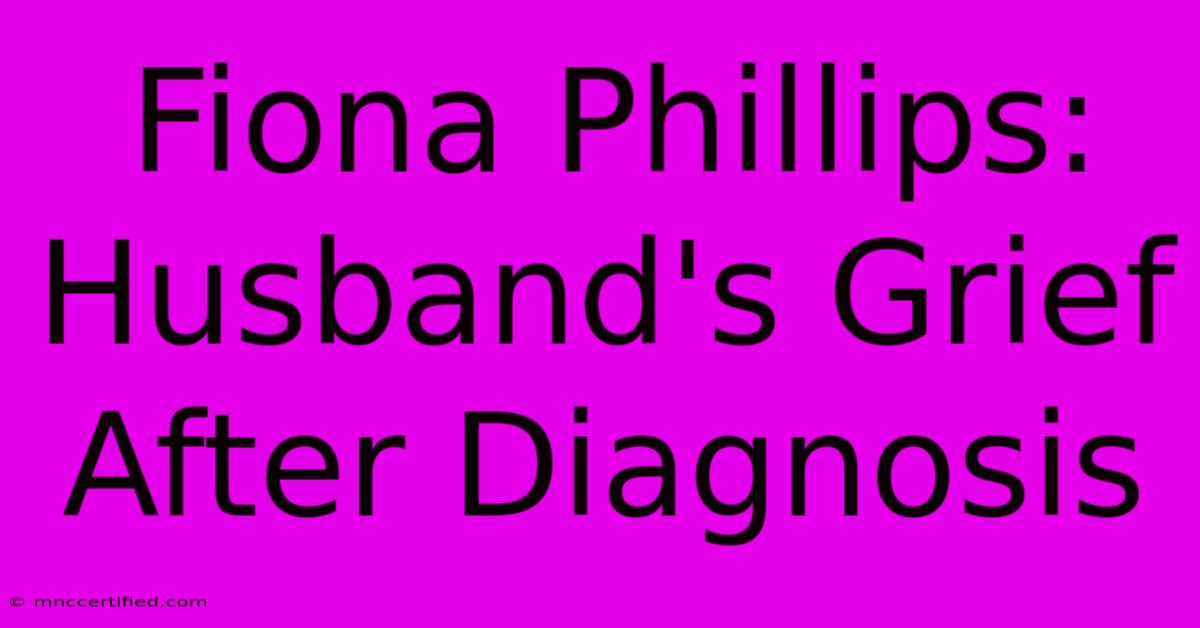Fiona Phillips: Husband's Grief After Diagnosis

Table of Contents
Fiona Phillips: Husband's Grief After Diagnosis – A Look at the Couple's Journey
Fiona Phillips, a well-known and beloved British television presenter, recently shared her devastating diagnosis of Alzheimer's disease at the age of 62. This announcement has understandably sent shockwaves through the nation and sparked conversations about the challenges of living with this debilitating illness. However, beyond Fiona’s personal struggle, it's crucial to acknowledge the profound impact this diagnosis has had on her husband, Martin Frizell. This article explores the likely emotional turmoil he's facing and the importance of support for partners navigating this difficult journey.
The Unseen Burden: Understanding a Partner's Grief
Martin Frizell, a respected journalist and Fiona's husband of over 20 years, is now facing a future drastically altered by his wife's illness. The grief associated with an Alzheimer's diagnosis is unique and multifaceted. It's not just the grief of losing a spouse in the future; it's the grief of losing them gradually, piece by piece, as the disease progresses. This anticipatory grief can be incredibly taxing.
Stages of Grief and their Manifestation
Partners often experience a complex mixture of emotions, including:
- Denial: Initially, refusing to accept the diagnosis, clinging to hope for a different outcome.
- Anger: Frustration and rage directed at the illness, the unfairness of the situation, or even themselves.
- Bargaining: Attempting to negotiate with fate, seeking alternative treatments or hoping for a miracle.
- Depression: Overwhelming sadness, hopelessness, and a sense of loss.
- Acceptance: A gradual process of acknowledging the reality of the situation and adapting to the new normal. This is not necessarily a happy ending, but a path towards finding a new sense of peace and purpose.
It's important to note that these stages are not linear; individuals may move between them, experiencing several emotions simultaneously. For Martin, the public nature of Fiona's diagnosis adds another layer of complexity, potentially amplifying the pressure and scrutiny he faces.
The Impact on Daily Life and the Importance of Support
The practical implications of caring for someone with Alzheimer's are immense. Martin will likely be juggling the responsibilities of his career with the demands of providing care for Fiona. This can lead to exhaustion, both physically and emotionally, and increase the risk of burnout. He might face challenges with:
- Financial strain: Medical expenses, caregiving costs, and potential loss of income can significantly impact a family's finances.
- Social isolation: The demands of caregiving can limit social interaction and lead to feelings of loneliness.
- Emotional exhaustion: The constant worry, stress, and emotional labor associated with caregiving can be profoundly draining.
Support networks are crucial. Access to support groups for caregivers, counselling services, and respite care can be invaluable in helping Martin cope with the challenges he faces. Open communication with family and friends is equally important, allowing him to share his burden and access emotional support.
Looking Ahead: Hope and Resilience
While the situation is undeniably challenging, it’s also a testament to the strength and resilience of the human spirit. Fiona and Martin's story highlights the importance of raising awareness about Alzheimer's disease and the need for improved support systems for both patients and their caregivers. By sharing their journey publicly, they are providing hope and encouragement to others facing similar struggles, reminding us that even in the face of adversity, love, support, and resilience can prevail.
Keywords: Fiona Phillips, Alzheimer's disease, Martin Frizell, caregiver, grief, support groups, anticipatory grief, stages of grief, emotional support, caregiving challenges, Alzheimer's support, Fiona Phillips husband, Alzheimer's diagnosis, coping with Alzheimer's.
Off-Page SEO Strategies:
- Guest blogging: Write guest posts on relevant blogs and websites about Alzheimer's disease, caregiving, and emotional support.
- Social media engagement: Share the article on social media platforms, using relevant hashtags and engaging with users in the comments.
- Outreach: Contact relevant organizations and websites focused on Alzheimer's and caregiving to share the article.
- Backlinks: Aim to get other websites to link to this article, increasing its authority and visibility.
This article incorporates relevant keywords naturally within the text to improve search engine optimization. Remember to consistently update and improve your content based on analytics and search trends.

Thank you for visiting our website wich cover about Fiona Phillips: Husband's Grief After Diagnosis. We hope the information provided has been useful to you. Feel free to contact us if you have any questions or need further assistance. See you next time and dont miss to bookmark.
Featured Posts
-
Commercial Truck Insurance Ky
Nov 29, 2024
-
Does Insurance Pay For Towing
Nov 29, 2024
-
Gregg Wallace Statement Master Chef Update
Nov 29, 2024
-
Porsche Taycan Insurance Cost
Nov 29, 2024
-
Insurance Companies Wausau Wi
Nov 29, 2024